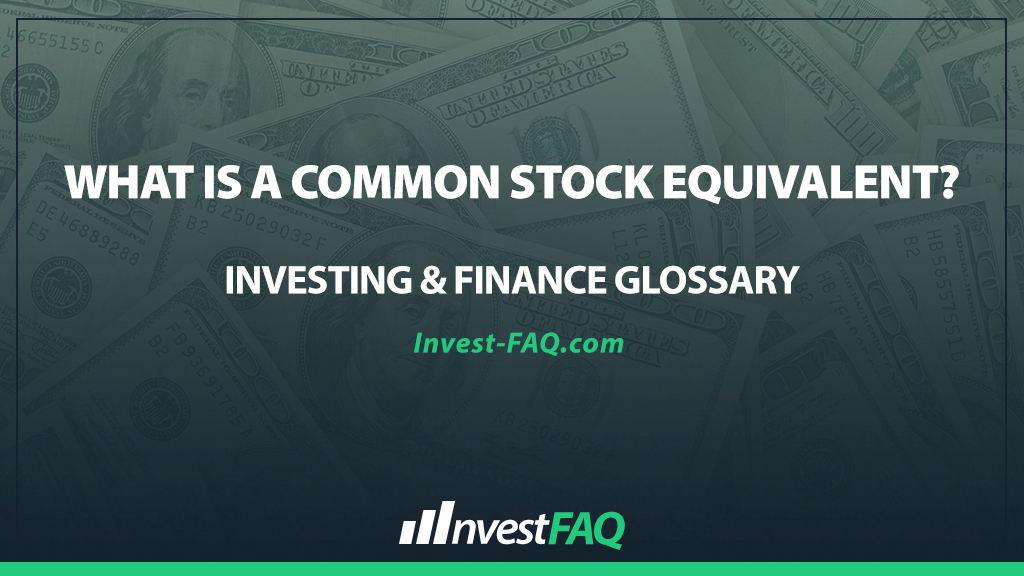
Common Stock Equivalent
Contents
A common stock equivalent is a type of security or financial instrument that can be converted into common stock, often under certain conditions or at a future date. These instruments include options, warrants, convertible bonds, and preferred stock, which have the potential to become common stock, impacting the equity structure of a company.
Common stock equivalents are important for businesses as they provide flexibility in raising capital without immediately diluting ownership. They can be attractive to investors who seek the potential for equity participation while benefiting from the characteristics of debt or preferred securities.
Companies use these instruments to attract investment under terms that can be advantageous for both the company and the investor.
Example of a Common Stock Equivalent
“FutureTech Inc.” issues convertible bonds with a total face value of $1,000,000. These bonds carry a 5% interest rate and can be converted into common stock at a rate of 1 share for every $50 of bond value. If all bonds were converted, it would result in the issuance of 20,000 shares of common stock.
Before Conversion:
Liability: Convertible Bonds Payable = $1,000,000
Interest Expense = 5% of $1,000,000 = $50,000 annually
Upon Conversion:
Decrease in Convertible Bonds Payable = $1,000,000
Increase in Common Stock and Additional Paid-in Capital = $1,000,000
Shares Issued = 20,000
In this scenario, “FutureTech Inc.” utilizes convertible bonds as a common stock equivalent to raise capital while offering investors an opportunity to participate in the company’s equity growth. The conversion feature is an incentive for bondholders, providing the potential for a more lucrative return on investment through equity in the company.
From an accounting perspective, the conversion of these bonds into common stock shifts the company’s financial obligations from debt to equity, reducing interest expenses and altering the company’s equity structure. This transition is carefully recorded to reflect the change in the company’s liabilities and equity accurately.
Significance for Investing & Finance
Common stock equivalents hold significant importance in accounting for several reasons:
Capital Structure Flexibility: They provide companies with versatile options for financing that can optimize the balance between debt and equity.
Investor Attraction: By offering potential equity participation, common stock equivalents can make financial instruments more appealing to investors, potentially lowering the cost of capital.
Earnings Per Share (EPS) Consideration: In calculating diluted EPS, common stock equivalents are considered to assess their potential impact on the company’s equity, which is crucial for investors assessing the value and risk of their investment.
Financial Reporting: Proper accounting for common stock equivalents is essential for transparent financial reporting, ensuring that stakeholders have a clear understanding of the potential future changes in equity structure.
In summary, common stock equivalents are a strategic financial tool for businesses, offering a way to raise capital with the flexibility of converting debt or preferred instruments into common equity.
Their proper accounting and management are crucial for transparent financial reporting and for providing a clear picture of a company’s financial health and potential future equity dilution.
FAQ
What defines a common stock equivalent in financial analysis?
A common stock equivalent refers to securities that can be converted into common stock, such as convertible bonds or options, and are considered in earnings per share (EPS) calculations to assess dilution potential.
Common stock equivalents are included in diluted EPS calculations, potentially lowering the EPS by increasing the number of shares considered outstanding, which reflects the potential dilution of earnings if these securities were converted to common stock.
Why are common stock equivalents important to investors?
Common stock equivalents are important to investors as they provide insight into the future equity structure of a company and the potential dilution of shares, which can affect the value of their investment.
Can all convertible securities be considered common stock equivalents?
Not all convertible securities automatically qualify as common stock equivalents; they are considered as such only if they meet specific criteria, like being in-the-money, which makes their conversion into common stock likely and relevant for diluted EPS calculations.
